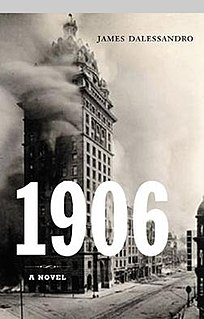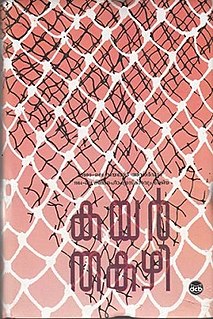 W
W1906 is a 2004 American fictional historical novel written by James Dalessandro. With a 38-page outline and six finished chapters, he pitched it around Hollywood in 1998 for a film by the same name, based upon events surrounding the great San Francisco earthquake and fire of 1906.
 W
WLes aventures de Télémaque, fils d'Ulysse with the original title is a didactic French novel by Fénelon, Archbishop of Cambrai, who in 1689 became tutor to the seven-year-old Duc de Bourgogne. It was published anonymously in 1699 and reissued in 1717 by his family. The slender plot fills out a gap in Homer's Odyssey, recounting the educational travels of Telemachus, son of Ulysses, accompanied by his tutor, Mentor, who is revealed at the end of the story to be Minerva, goddess of wisdom, in disguise.
 W
WThe Count of Monte Cristo is an adventure novel written by French author Alexandre Dumas (père) completed in 1844. It is one of the author's more popular works, along with The Three Musketeers. Like many of his novels, it was expanded from plot outlines suggested by his collaborating ghostwriter Auguste Maquet.
 W
WThe Empire City is a 1959 epic novel by Paul Goodman.
 W
WThe Investiture of the Gods or The Creation of the Gods, even The Birth Of The Chinese Gods. also known by its Chinese names Fengshen Yanyi and Fengshen Bang (封神榜), is a 16th-century Chinese novel and one of the major vernacular Chinese works in the gods-and-demons (shenmo) genre written during the Ming dynasty (1368–1644). Consisting of 100 chapters, it was first published in book form between 1567 and 1619. Another source claims it was published in 1605. The work combines elements of history, folklore, mythology, legends and fantasy.
 W
WJourney to the West is a Chinese novel published in the 16th century during the Ming dynasty and attributed to Wu Cheng'en. It is one of the Four Great Classical Novels of Chinese literature. It has been described as arguably the most popular literary work in East Asia. Arthur Waley's popular abridged translation, Monkey, is well known in English-speaking countries.
 W
WKayar is a 1978 Malayalam epic novel written by Thakazhi Sivasankara Pillai. Widely considered one of the most seminal works in Malayalam literature, Kayar received many major literary awards, including the Jnanpith, India's highest literary honour.
 W
WThe Lord of the Rings is an epic high fantasy novel by the English author and scholar J. R. R. Tolkien. Set in Middle-earth, the world at some distant time in the past, the story began as a sequel to Tolkien's 1937 children's book The Hobbit, but eventually developed into a much larger work. Written in stages between 1937 and 1949, The Lord of the Rings is one of the best-selling books ever written, with over 150 million copies sold.
 W
WSaraswatichandra is a Gujarati novel by Govardhanram Madhavaram Tripathi, an author of early twentieth century from Gujarat, India. Set in 19th-century India, It is acclaimed as one of the masterpiece of Gujarati literature. Though the novel was published in four parts, each part has a distinct thematic content, its own cast of characters and independent beginnings and ends. It was adapted into several plays, radio plays, films and TV series. It was well received by the number of critics, and was translated into several Indian languages, along with English. However, Suresh Joshi, a strong proponent of formalism theory, criticized the novel for its structural failure.
 W
WTreasure Island is an adventure novel by Scottish author Robert Louis Stevenson, narrating a tale of "buccaneers and buried gold." Its influence is enormous on popular perceptions of pirates, including such elements as treasure maps marked with an "X", schooners, the Black Spot, tropical islands, and one-legged seamen bearing parrots on their shoulders.
 W
WVenezuela Heroica: Cuadros históricos is a Venezuelan novel. It was written by Eduardo Blanco and published in 1881, with an expanded second edition in 1883. It is Blanco's main work, and presents a classic romantic view of history as an epic. Venezuela heroica is structured in five vignettes that depict the main battles and heroes of the Venezuelan War of Independence. It was from General José Antonio Páez himself that Blanco heard the stories of the Battle of Carabobo, during an encounter with Marshal Juan Crisóstomo Falcón to end the Federal War (1859–1863) near the site of the battle. Páez was so moved from his memories of youth, the anecdote goes, that he could not stop telling his aide (Blanco) the details of the battle. It was Falcón who then told Blanco "you are listening to the Iliad from the very lips of Achilles".
 W
WWar and Peace is a novel by the Russian author Leo Tolstoy, first published serially, then published in its entirety in 1869. It is regarded as one of Tolstoy's finest literary achievements and remains a classic of world literature.
 W
WWatership Down is a survival and adventure novel by English author Richard Adams, published by Rex Collings Ltd of London in 1972. Set in southern England, around Hampshire, the story features a small group of rabbits. Although they live in their natural wild environment, with burrows, they are anthropomorphised, possessing their own culture, language, proverbs, poetry, and mythology. Evoking epic themes, the novel follows the rabbits as they escape the destruction of their warren and seek a place to establish a new home, encountering perils and temptations along the way.